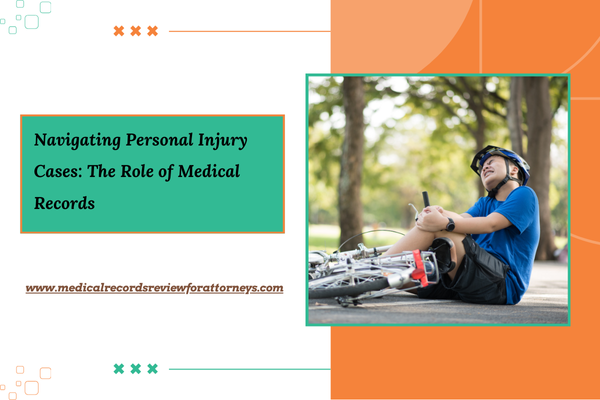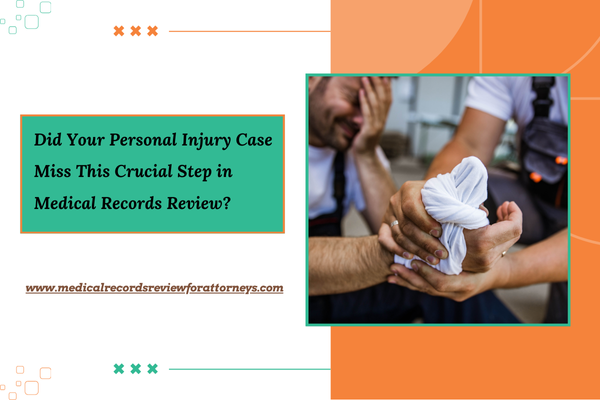
Introduction
A personal injury cases are a legal dispute arising from the negligent or intentional acts of one party that caused damage to another. Most often, the determination of liability, causation, and damages forms the crux of these cases. It is for this reason that medical documentation becomes indispensable in these cases as they are either made or destroyed.
Understanding Different Types of Personal Injury Cases
Where someone fails to exercise reasonable care expected by law at a given time thereby causing harm to another person; it qualifies as a personal injury suit under tort law. These cases most often revolve around negligence.
1. Car Accidents as Common Grounds for Personal Injury Claims
Car accidents are common causes for people seeking compensation for personal injury claims. In such situations, medical records play a significant role in:
- Determining the Extent of Injuries: Detailed medical documentation can provide information about the injuries suffered, the treatments received, and any ongoing health problems.
- Establishing Liability through Negligence: For instance, if a driver runs a red light and causes an accident, medical records can support the claim that the injuries were directly caused by this negligent behavior.
2. Slips, Trips, and Falls: Seeking Compensation for Injuries on Someone Else’s Property
Injuries occurring on another person’s premises due to hazardous situations like wet floors or irregular surfaces are called premises-related injuries. During these times, medical records are used in several ways:
- Providing Evidence of Dangerous Conditions: Documenting injuries such as fractures or sprains can help demonstrate that there were unsafe conditions present.
- Establishing the Responsibility of Property Owners: Property owners have a legal obligation to keep their premises safe for visitors. Medical records can support claims that this duty was breached.
In slip and fall cases, detailed medical notes about the immediate treatment received after an incident can be crucial in proving both the fact that an accident occurred, and the seriousness of the injuries sustained.
Exploring the Significance of Medical Records in Personal Injury Claims
Medical papers are significant evidence when it comes to personal injury cases. They often determine both causation (explaining how the accident led to injuries) and liability (who should be held accountable for causing an accident).
This is why medical records are important:
- Detailed Information: They give a detailed account of injuries, treatments, and medical opinions involved in the case.
- Proof of Injuries: Medical records show that the alleged injuries were real and caused by the accident.
- Treatment History: These keep track of when medical services have been received for an injured party thus enabling a court to determine the gravity of his or her injury.
Role Played by Healthcare Professionals in Understanding Complex Medical Information
For non-medical staff like lawyers or insurance adjusters understanding complex medical information can be very difficult. That is where healthcare professionals specialized in personal injury cases come into play.
Let us see how they can help:
- Providing Expert Opinions: Healthcare professionals offer expert opinions on matters to do with diseases, types of medications, or long-term side effects from injuries suffered by a patient.
- Identifying Inconsistencies or Gaps: Every inconsistency/missing section concerning any part could lead to questioning whether such data is true or even complete according to health experts.
- Explaining Medical Terminology: Health personnel can simplify the sophisticated language concerning health and thus everyone can comprehend.
Working with health professionals will ensure a more accurate assessment of their client’s medical information both in the past as well as now by a legal team.
Utilizing Medical Records as Strong Evidence in Personal Injury cases
Common Challenges Faced in Reviewing and Interpreting Medical Records for Legal Purposes
- Technical Language: Understanding medical jargon, abbreviations, and procedural codes.
- Volume of Information: Managing large amounts of disorganized records.
- Consistency Issues: Identifying discrepancies or missing information that could weaken a case.
This complexity makes special services invaluable. They are.
- Organize Records: Condensing vast amounts of data into manageable summaries.
- Summarize Key Points: Identify key facts relevant to the injury claim.
- Identify Gaps: Detect missing documents or inconsistencies that need addressing.
Conclusion
The medical records play a critical role. It gives details about the injury, treatment, and probable future health issues which form the basis of a strong legal argument. This will enhance the chances of winning your personal injury cases and attaining optimal results for you
Unlock the Power of Medical Records in Personal Injury Cases
FAQs (Frequently Asked Questions)
What are Personal Injury Cases?
Personal injury cases refer to legal disputes arising from incidents where one person gets harmed due to another party’s careless or intentional act. They primarily consist of proving causation and damages; demonstrating a breach of duty; and establishing duty care.
How do Medical Records Play a Role in Personal Injury Litigation?
For example, they give evidence on the injuries received by an individual concerning their extent of severity and still help establish cause at their core of perusal over all else. These documents prove how serious injuries have affected someone’s life.


